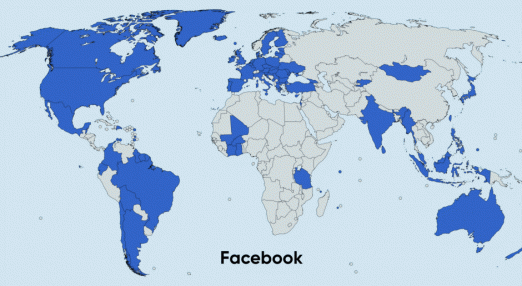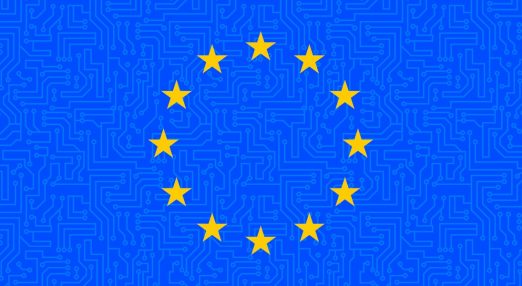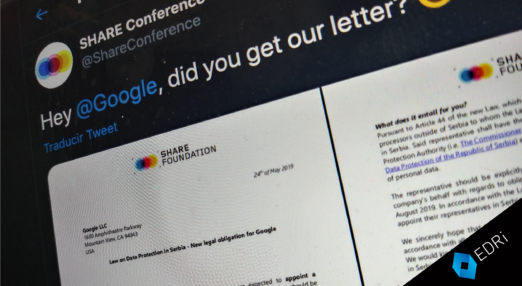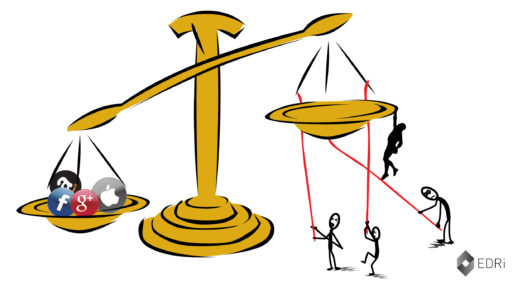Filter by...
-

Online political ads – a study of inequality in transparency standards
In its new report, EDRi member PI looks into the implementation of transparency tools by Facebook, Google and Twitter in relation to political advertising. This work was produced in collaboration with partner organisations InternetLab and ELSAM.
Read more
-

Big Tech’s dominance: only laws can limit its power
Big Tech companies like Facebook have grown so large that the U.S. antitrust authority F.T.C. is considering breaking them up. We need laws that limit the power tech firms wields over our lives.
Read more
-

German Corona tracing app available without Google services
A handful of Free Software developers today achieved what official bodies have been missing for months: They have made available the German Corona Warn App for tracing Covid-19 risk contacts in a version that is completely free of dependencies on Google and available in F-Droid, the Free Software app store.
Read more
-

Consumer and citizen groups continue to have serious concerns about Google Fitbit takeover
Regulators investigating Google’s takeover of Fitbit are reportedly seeking commitments from Google to allow them to clear this deal. It is widely recognised that this takeover raises serious competition and privacy concerns and risks harming citizens and consumers in several markets including wearables, advertising and digital health.
Read more
-

‘Not On Our Watch’: A public campaign against Google’s jump into our health data
Monopolies, mergers and acquisitions, anti-trust laws. These may seem like tangential or irrelevant issues for privacy and digital rights organisations. But having run our first public petition opposing a big tech merger, we wanted to set out why we think this is an important frontier for people's rights across Europe and indeed across the world.
Read more
-

First Analysis of the Austrian Anti-Hate Speech Law (NetDG/KoPlG)
On September 3rd the Austrian government released a legislative package to tackle online hate speech. Besides a comprehensive justice reform, the package also contains a bill that creates new obligations for online platforms to remove illegal user-generated content. This article offers a first analysis of the so called Kommunikationsplattformen-Gesetz (KoPl-G) and the many similarities it has to the German Netzwerkdurchsetzungsgesetz (NetzDG).
Read more
-

Spain: Catalan government agrees to improve privacy in schools
The Catalan Department of Education has signed an agreement accepting the plan proposed by Xnet, EDRi member from Spain, titled “Privacy and Democratic Digitization of Educational Centers,” to guarantee the privacy of data and the democratic digitization of schools. The plan foresees the creation of a software-pack and protocols that ensure the educational establishments have alternatives to what until now seemed the only option: the technological dependence on Google and its attached elements, with worrying consequences on individual data.
Read more
-

SHARE’s campaign bears fruit: Google appoints Serbian representatives
Serbian citizens can now bring their objections and requests regarding Google’s use of their private data to the tech giant’s new representative in the country.
Read more
-

Competition law: Big Tech mergers, a dominance tool
This is the third article in a series dealing with competition law and Big Tech. The aim of the series is to look at what competition law has achieved when it comes to protecting our digital rights, where it has failed to deliver on its promises, and how to remedy this.
Read more
-

Google: seizing a crisis to legitimise mass surveillance?
Even in times of Corona, Google follows you wherever you go. The company collects and processes all our location data en masse and can thus graph how well we adhere to the imposed measures.
Read more
-

Stalked by your digital doppelganger?
In this fourth installment of EDRi’s facial recognition and fundamental rights series, we explore what could happen if facial recognition collides with data-hungry business models and 24/7 surveillance.
Read more
-

Facebook and Google asked to appoint representatives in Serbia
Three months before the new Serbian Law on Personal Data Protection becomes applicable, EDRi member SHARE Foundation asked 20 data companies from around the world – including Google and Facebook – to appoint representatives in Serbia as required by the new law. This is crucial for providing Serbian citizens and competent authorities with a contact […]
Read more
